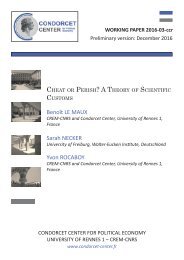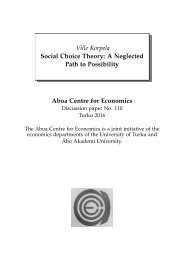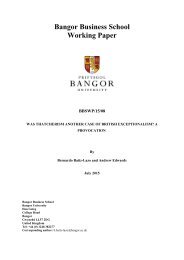MEMORANDUM
n?u=RePEc:hhs:osloec:2016_018&r=hpe
n?u=RePEc:hhs:osloec:2016_018&r=hpe
Create successful ePaper yourself
Turn your PDF publications into a flip-book with our unique Google optimized e-Paper software.
student had conveyed a very positive opinion of him and he was released shortly<br />
afterwards. 54<br />
The most serious incident which led to the arrest of Leontief and many other students<br />
took place in 1922. After unrest and a teachers’ strike at the university in the spring of<br />
1922 some professors were banned from teaching, one of them Leontief’s teacher Pitirim<br />
Sorokin. The unrest continued and the government prepared retaliatory measures to<br />
suppress “the influence of anti-Soviet groupings of the intelligentsia.” The majority of<br />
students supported the teachers. Leontief took part in mounting large posters on military<br />
building walls. He was arrested together with an older girl student carrying posters and a<br />
pail of glue.<br />
“We called for freedom: freedom of the press, freedom of expression, freedom in the<br />
state. We protested against the suspension from teaching of our professors. We went<br />
with the posters at three at night. But probably they knew about us in advance. We<br />
were followed almost from the very beginning. We went and stuck up the posters, but<br />
half a verst away some people followed us, then they overtook us and arrested us. We<br />
were sent to the Gorokhovaia.” 55<br />
This incidence resulted in long imprisonment (for a student), perhaps three months.<br />
The experience left very vivid memories which Leontief told and re-told with many<br />
intriguing details. He described the cell (or one of them) as having 4-5 meters to the<br />
ceiling with a very weak bulb (10 watts) high above him. His parents were entitled to bring<br />
book and he had requested a book about Rodbertus as he was then preparing a paper about<br />
Rodbertus at the university. But he could read the book only by “standing on one foot on<br />
the plank bed, to be a little closer to the light … so in this manner I prepared that work.” 56<br />
Leontief’s account had descriptive feature known from other accounts, such as being<br />
held much of the time in solitary confinement, “in half-dark, verminous, cold cell” with<br />
interrogations at night, beginning say at three o’clock. “Usually there were two men …<br />
they scare you, they say, you know, we can shoot you. 57 But when you are fifteen, one<br />
cannot, doesn’t imagine.” Leontief’s version of the interrogations he was exposed to was<br />
much less sinister. He tended to give a rosy and somewhat naïve account of the whole<br />
affair, e.g. that the interrogators were intellectuals with whom one could have long<br />
discussions on Hegel, Marx and Russian philosophy. Leontief was, however, not aware of<br />
54 Kaliadina (2006, p.349).<br />
55 Kaliadina (2006, p.350).<br />
56 Kaliadina (2006, p.351).<br />
57 From autobiographical notes by Leontief 1954.<br />
19





